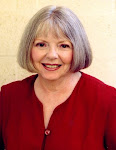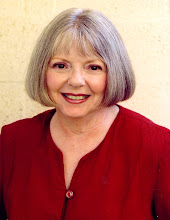I just returned from teaching a two-hour writing workshop in the cool pines of Northern Arizona, and some of the comments I heard up there made me rethink this crazy business of writing. So for my next four posts, I'm going to discuss some topics that came up. Feel free to chime in. For starters...
Writing is hard. Getting published is even harder.
To write a book, you first have to come up with a marketable idea, then develop the discipline to actually sit down and write the darned thing. Along the way, you have to learn how to write (more about that later). Once these things are accomplished, you have to maintain your momentum in order to shepherd the manuscript through the agenting and publishing process -- and then develop the stomach necessary to hit the tour trail and talk about your book until you're blue in the face.
Being a writer as well as a creative writing teacher has taught me that if a writer lacks any one of the above qualities, his chances for success are slim.
Let's start with the first quality -- the marketable idea. Heck, anyone can come up with an idea. Your three-year-old can. But is the idea a marketable idea? Most of you know that besides being a mystery novelist, I am also a book reviewer (and have been for 20 years), so I've read just about every plot imaginable, from face-eating aliens, to frail femmes being menaced by brutes, to charming serial killers, to chipper urbanites in search of love, to angst-ridden coming-of-agers contemplating their navels while trying to figure out what life is all about.
There are NO new ideas. There are, however, old ideas made newly marketable -- and what makes an old idea marketable is to give it a fresh spin (the face-eating alien is the protagonist's mother, the chipper urbanite in search of love is an iguana at the Bronx Zoo). Also necessary is a lead protagonist who makes us want to stand up and cheer for him while he's undergoing all the trials he's faced with during your 65,00-85,000 word manuscript. By the way, I didn't choose that word count arbitrarily; it's the standard word count for the average "first novel" manuscript. Anything less and the MS would be a novella (few publishing prospects there!) and anything more would hike the book's production costs so high that some publishers will be disinclined to take the financial risk.
Let's say you've come up with a new spin on an old plot (man comes home from a long business trip to find his wife surrounded by admirers, has a jealous fit, kills them, etc. -- a la The Odyssey). Now it's time to write the book. Oh, excuse me. Sorry. Now it's time to learn how to write. Yes, you can learn how to write by writing, but you can learn even faster if you read a few good books on writing (the library has dozens -- make friends with your local librarian). For instance, when I was writing my first novel, I read something like 20 books on novel-writing, then studied my manuscript carefully to see if I'd done the "do"s and didn't do the "don't"s. I'd done ALL the "don't"s! Seventeen drafts later, using everything I'd learned in those books, I was able to sell my manuscript (but that was seventeen drafts on an old Smith-Corona portable typewriter!).
The learning curve can be further sped along by taking a college-level writing course taught by the right instructor. Make sure you check out the instructor's bona fides, though. Some instructors teach writing from a strictly literary point of view instead of teaching practicalities. Some instructors specialize in the practicalities and leave the literary stuff to the writer's own taste and conscience. How can you tell the difference? By reading what the instructor has published, that's how. This is very, very important, because you don't want to wind up in the hands of someone who has contempt for the type of writing you want to engage in. If you want to write a commercial novel -- thriller, mystery, romance, sci-fi, etc. -- try to find someone who teaches the particular type of commercial fiction you want to specialize in. If you want to write a slower-paced, jewel-like literary novel, find an instructor who specializes in that form. But whichever type of instructor you choose, make certain he or she has actually PUBLISHED the kind of material you want to write. You don't want a theorist; you want someone who knows FROM EXPERIENCE exactly how to write a novel.
If you don't have a college or university nearby and for whatever reason you can't avail yourself of the various writing conferences that take place around the country, try a critique group. I am a great believer in critique groups because each of us, no matter how experienced, needs what is called a "first reader." The ideal "first reader" is a person who does not love us, who owes us nothing, but who reads a lot. When worse comes to worse, though, and you can't dig up someone who fits that description, let your spouse read your manuscript. But spouses can be problematic. Sometimes they love us too much to provide sensible feedback (sometimes they hate us too much, but that's an issue best left to your marriage counselor). Ideally, you'll be better off with a well-read person who isn't emotionally invested in either your success or failure.
Which brings us back to critique groups. A GOOD critique group will act as your "first reader." Let's say you're very proud of your Chapter 4, wherein Uhoh, the runaway orangutan from the Taiwan Zoo, finds Louisa, the orangutan love of his life, and the two swing happily by their tails from a tree in the lush Sahara Delta. You've worked on this chapter for three weeks, and you think you have Uhoh's complex emotions down just right, his fears, his longings... and you are especially proud of the artistic way you've described his curly fur and blue-and-white-striped snout. Not only that, you think the scene were Uhoh first meets Louisa is one of the most tender love scenes you've ever read. At least that's what your wife told you, and since she says you're a real tiger in bed, she ought to know.
If you're in a GOOD critique group, someone will point out to you that orangutans don't have tails, that there is no true delta in the Sahara, that orangutan coats aren't curly, and orangutans do not have blue-and-white-striped snouts (you've confused your primates).
The more educated eyes that see your manuscript, the better. Chances are, each member of the critique group will have a different area of expertise, thus can catch you out when you screw up. My own critique group -- the Sheridan Street Irregulars -- includes a computer expert, a retired FBI agent, an attorney, a private investigator, an ex-cop, a veterinarian, an actress, a business executive, and a prison guard. Past members of the group have included a private school headmaster, a judge, a social worker, a hobby shop owner, a physician, a house painter, several housewives, a gardener, a photographer, and various and sundry members of other professions and occupations. They knew things I didn't. Although I research the hell out of each of my books, there's always going to be some tiny little thing I didn't think to check. Good critique groups rock!
Now let's talk about BAD critique groups.
A critique group goes bad when one person decides he or she knows more about writing than anyone else in the group, and elects himself/herself the Grand Poobah. Be leery about involving yourself in this kind of group because it can do more harm than good. Usually, the Grand Poobah knows little about professional-level writing -- he just thinks he does. Unfortunately, a beginning writer might not realize that the Grand Poobah is critiquing out of ignorance, and takes all that hot air for gospel.
What makes a good critique group? For starters, a good critique group is made up of a circle of writers who respect each other and know that there are different ways of saying the same thing. They are people who read widely in different genres, and recognize that the other writers in the group have, too. No one is a blowhard. No one is mean. Each writer is careful to make his critique SPECIFIC, not vague (Example of a good critique: "I think Joe's character needs more depth in this chapter. Maybe you should let us see his thoughts more often. For instance, what made him fall out of love with his wife in the first place? If you let the reader know what first attracted Joe to her and what has now changed, you might be able to approach their break-up in a more realistic way."). And a good critiquer should always be quick to COMPLIMENT the good parts of a manuscript while remaining truthful (but not hurtful) about the weak parts.
Can't find a critique group? Start your own; that's what I did. I hung fliers in all my branch libraries, and joined a few local authors associations, where I let them know I was looking for other writers. In the end, I actually put an ad in my community newspaper. Next thing you know, I had a critique group. That was 20 years ago, and we're still going strong.
Suggested rules for critique groups:
1. When being critiqued, do NOT defend your work. Just listen quietly.
2. The critiquer should NOT ask questions of the person being critiqued; this leads to what can become an acrimonious, time-wasting back-and-forth argument.
3. DO set a timetable for the length of a critique, because some people can talk forever.
4. Critique in a clockwise (or counter-clockwise) direction. This keeps up the flow, and makes certain EVERYONE critiques (very important).
5. Stay away from vague statements, such as "I like this" or "I hate this," leaving that as the sum total of your critique. Good critiques, like good writing, are always specific.
6. Don't critique typos and grammar wowsers. Mark them up, but keep your critique comments to the writing itself, otherwise you'll be there all night.
7. In the Sheridan Street Irregulars, we do not read manuscripts out loud and critique from that. Why? Because agents and editors aren't going to hear writers reading their work aloud -- they're going to see only the printed page. Therefore, we SSI'ers print out enough copies of our manuscripts so that each member can take one home, go over it during the week, mark the MS up, and have their comments ready for the next meeting. We limit these handouts to 20 pages per submission, otherwise we'd be critiquing manuscripts 'til Doomsday.
8. Although back-and-forth talk (and defense of manuscripts) is frowned upon during the session itself, at the end of the evening, after everyone has been critiqued, it is fine to ask questions about a particular critique. But again, never, ever defend your work; that kind of thing just causes bad feelings. It's pointless, too. If you haven't managed to make your manuscript clear to your readers, then you need to rework it.
On another subject: The most important advice I have to give in this post about writing concerns your reading habits. Want to write a mystery? Then read at least 10 mysteries that have been published this year, and among those 10, read the Edgar, Anthony, and Agatha winners of this year. The same approach is true whether you want to write a romance, a sci-fi novel, a thriller, or what have you. Too many beginning writers haven't done their homework by keeping up on the changes in their chosen genres. Commercial fiction -- especially thriller, mystery, and romance -- has changed enormously in the past 10 years. Even in the past five! So stay current in your reading. After all, you don't want to spend a year of your life writing the type of book that's been outdated for decades, do you? Writing is a profession, just like any other. Would you go to a doctor who hasn't picked up a medical journal in 10 years? Would you hire an engineer who hasn't kept up with important stress findings in the past 10years? No, you wouldn't. So hie thee to the library and ask that wonderful librarian what are the best books OF THIS YEAR in your chosen field. A librarian will never steer you wrong.
NEXT WEEK: Sitting down to write that book!
Sunday, August 24, 2008
Subscribe to:
Post Comments (Atom)










1 comment:
Betty, I certainly agree with you about the usefulness of critique groups. A few additions and quibbles:
I don't see them as alternatives to classes, but as additions. We need both to keep upgrading our skill level.
One crucial feature of a writers' group (to me, anyway) is that it offers more than critiques. We call the group I helped establish "a mystery support group". Yes, we critique but we also ensure that we each get enough encouragement to stay in the game. We all began as beginners in the field (seven years ago) and we needed fertilizer as much as we needed pruning.
You mention the fact-checking aspect of critique groups and also the deeper structure of character. I've seen our group evolve from pointing out typos and dubious facts toward a focus on plot, character, and voice. We've become more useful to one another as we develop. And the only way to develop is to keep writing.
My first mystery, Night Kill, is almost out, which never would have happened without my critique group!
Post a Comment